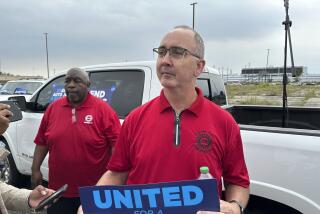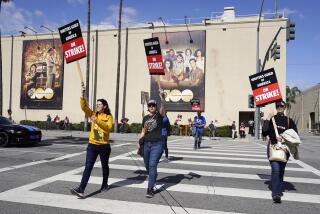Miners Strike in Britain
- Share via
For the well-being of those she is currently teaching at UCLA, it is to be hoped that Patricia S. Seleski’s knowledge of modern British history is more profound and less distorted than is evident from her letter (March 23), “A Visiting Britons’s View of the Miners’ Strike.”
Teachers are disseminators of facts and do their profession much disservice by allowing their political beliefs grossly to bias their interpretation of those facts. Even more disturbing to our hosts in California is the thought to which polemics your youth is being subjected by “visiting lecturers” under the guise of teaching.
The Tories were returned to power in Britain in 1983 with an overwhelming majority and a clear mandate to curb the power of the trade unions--a majority that included for the first time a large number of trade unionists . . . of whom only 33% voted for the Labor Party.
The miners’ strike was both undemocratic and unlawful as no general ballot was called. It should be remembered that Arthur Scargill, currently in Moscow, no doubt to get new instructions, had been defeated by the ballot box on two previous occasions when he called for strike action. This time he changed the rules of the game without reference either to his union’s or the nation’s laws. Small wonder that “his” strike received little or no support from the official Labor Party or any other major trade unions.
Many miners were on strike, not because of their beliefs, but due to massive intimidation, both on the picket lines and within their own communities. When Scargill ran out of cash to pay his goons, the miners voted with their feet and returned to work in droves.
The plain truth is that a group of left-wing activists, bent on destroying this government, as they did Edward Heath’s, hijacked the once great and dignified National Union of Mineworkers--an action that not only cost Britain nearly $5 billion, but also crippled the very industry they claimed they were trying to save.
The National Coal Board’s original proposals could hardly be construed as either “strike-breaking” or “union-bashing.” The offer was for increased wages (far in excess of those accepted by others working in nationalized industries); guarantees of no compulsory redundancies; resettlement in the event of pit closures and, in the case of voluntary retirement, payments of up to $40,000 for miners under 50 years old or double that amount for men with longer service. A far cry from the Tolpuddle Martyrs 150 years ago.
Seleski chastises Thatcherism for the “failure of its economic policies” and “the huge deficits” the Tories are running. Does she seriously argue that it makes sound economic sense to produce coal that costs five or 10 times more to mine than the market price?
She would do well to remember the British tradition of national loyalty when abroad and to remind herself that, whilst she personally has “little problem with Scargill’s Marxism,” the democratically governed British people eschew extremism of any kind and, in common with the American press, hope that the scars from this totally misconceived debacle will heal quickly and enable the British economy to continue on its road to recovery.
LORD HANSON
Palm Springs
Hanson is chairman of the board of Hanson Trust, Britain’s 11th largest company. He is a member of Parliament in the House of Lords.
The miners were never given an opportunity to say yes or no on the strike. Arthur Scargill and his self-confessed Communist deputy blatantly and consistently ignored their own union rules on a strike ballot.
Equally, the National Coal Board (and Margaret Thatcher) failed both working and striking miners by not invoking the very laws but could have ordered a ballot.
Seleski uses the term police brutality!-- an emotional phrase. From time to time, no doubt the police overreacted. But, confronted with a howling “rent a mob,” hurling missiles and abuse, specifically bused in to disrupt and intimidate, what does a policeman do? Some winners face prosecution for property damage. Certain others face a murder charge for dropping a concrete block over a bridge parapet killing a taxi driver below who was taking another miner to work.
Eleven thousand miners quit the industry during the strike on very generous redundancy payments. Since the end of the strike a further 26,000 have applied for redundancy for which the longer serving men will receive 41,400 U.S. dollars severance payment.
The miners, undoubtedly, were the dupes of their leaders. They enjoyed better wage levels and conditions than most of their counterparts in other unions. In addition, the Thatcher government has a far superior investment record in the coal industry than any previous socialist government.
W. STURROCK
Garden Grove
Like most lefties, Seleski appears to be suffering from the usual convenient memory.
I live in West Yorkshire, England, and have seen at firsthand the effects of the recent long coal strike, it is a known fact that members of the National Union of Mineworkers were not balloted as to whether they were in favor of a strike or not. They were told to strike by Arthur Scargill whose Marxist policies clashed with those of Margaret Thatcher; he thought he was a winner to bring her government down as was the case with Edward Heath a few years ago. So against all odds she held out and ultimately won the day.
Does Seleski remember Harold Wilson, taking over from Edward Heath, and then proceeding to give the unions all they demanded? Does she also remember the last days of the Callaghan government when the “winter of discontent” brought that Labor government down and brought Mrs. Thatcher to power. She was then confronted with a Herculean task of trying to remove the outrageous hold the trade unions had on the United Kingdom. The final weeks of James Callaghan’s government were torture for the British public; there were power cuts, road and rail strikes and even the dead were left unburied as undertakers were having to stack them in warehouses.
It was only common sense to close unprofitable pits, as was the case years ago when the Welsh slate quarries were worked out. Again Seleski does not mention the unbelievable severance pay that had been offered to the miners who would be unemployed due to closure. It was, and is, an amount beyond their wildest dreams.
Another thing the United Kingdom has discovered, coal can be bought from as far away as Australia, shipped and carted to the steel mills, etc., at a cheaper rate than the U.K. miners can bring it to the top. Even the U.S. coal is by far cheaper under the same rules and is of equal quality.
Socialism brought nationalization at a tremendous cost to Britain, and any fool knows by now that socialism in all recorded history has never succeeded. Finally, the parlous state of the pound is mostly due to Scargill--in fact, it is now known in Britain as “the Scargill pound.”
TOM GIBLIN
Rancho Mirage
More to Read
Sign up for Essential California
The most important California stories and recommendations in your inbox every morning.
You may occasionally receive promotional content from the Los Angeles Times.












